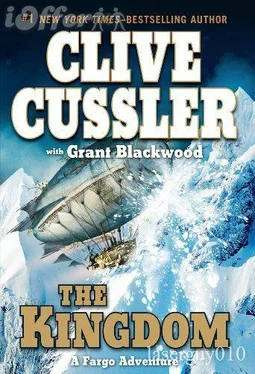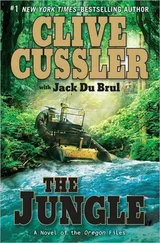“Best to sneak in the back window, then. Do you have a signal?”
Remi grabbed the satellite phone from between her feet and checked for voice messages. After a moment she nodded, held up a finger, and listened. She hung up. “Professor Dharel from the university. He made some calls. Evidently there’s a local historian in Lo Monthang who is considered the national expert on Mustang history. He’s agreed to see us.”
“How soon?”
“Whenever we get there.”
Sam considered this and shrugged. “No problem. Providing we don’t get caught invading King’s mining camp, we should make Lo Monthang in three or four weeks.”
He shifted the Rover into drive and pressed the accelerator.
Almost immediately the grade steepened and the road began zigzagging, and soon, despite an average speed of ten miles per hour, they felt like they were on a roller-coaster ride. Occasionally through the passing foliage they caught glimpses of gorges, surging rivers, and jagged rock outcroppings, soon gone, absorbed by the forest.
After nearly ninety minutes of driving, Sam came around a particularly tight bend. Remi shouted. “Big trees!”
“I see them,” Sam replied, already slamming on the brakes.
Looming before the windshield was a wall of green.
“Tell me it isn’t so,” Sam said. “Selma made a mistake?”
“No chance.”
They both climbed out, ducking and weaving their way through the foliage surrounding the Rover until they reached the front bumper.
“And no valet, either,” Sam muttered.
To the right, Remi said, “I’ve got a path.”
Sam walked over. As promised, a narrow, rutted trail disappeared into the trees. Sam dug out his compass, and Remi checked their bearing against the map.
“Two miles down that trail,” she said.
“So, translated to Nepalese distances . . . ten days, give or take.”
“Give or take,” Remi agreed.
The trail took them through a series of down-sloping switchbacks before bottoming out beside a river. Flowing from north to south, the water crashed over a series of moss-covered boulders, sending up plumes of spray that left Sam and Remi dripping wet in a matter of seconds.
They followed the path south along the river to a relatively calm section, where they found a wooden suspension bridge barely wider than their shoulders. The canopy from both banks spanned the water; vines and branches draped over the bridge and obscured the other side.
Sam shed his pack and, with both hands clenched on the rope side rails, crept onto the bridge’s head, probing with his foot for cracks or loose planks before transferring his weight. When he reached the bridge’s midpoint, he tried a test hop.
“Sam!”
“Seems sturdy enough.”
“Don’t do that again.” She saw the half smile on his face, and her eyes narrowed. “If I have to jump in after you . . .”
He laughed, then turned and walked back to where she was standing. “Come on, it’ll hold us.”
He donned his pack and led the way back on the bridge. After two brief pauses to let the bridge’s swaying slow, they reached the other side.
For the next hour they followed the trail as it weaved up and down forested slopes and across gorges until finally the trees began to thin ahead. They topped a crest and almost immediately heard the rumble of diesel engines and the beep-beep-beep of trucks backing up.
“Down!” Sam rasped, and dropped to his belly, dragging Remi with him.
“What?” she said. “I didn’t see anything-”
“Directly below us.”
He gestured for her to follow, then turned his body left and crawled off the trail into the underbrush. After twenty feet he stopped, glanced back, and curled his finger at Remi. She crawled up beside him. Using his fingertips, Sam parted the foliage.
Directly below them was a football-shaped earthen pit, forty feet deep, two hundred yards wide, and nearly a quarter mile long. The sides of the pit were perfectly vertical, an escarpment of black soil dropping away from the surrounding forest as though a giant had slammed a cookie cutter into the earth and scooped out the center. In the center of the pit itself, yellow bulldozers, dump trucks, and forklifts moved to and fro on well-worn paths, while along the edges teams of men worked with shovels and picks around what looked like horizontal shafts that disappeared into the ground. At the far end of the pit, an earthen ramp led up to a clearing and, Sam and Remi assumed, the main service road. Construction trailers and Quonset-style huts lined the sides of the clearing.
Sam continued to look around the site. “I’ve got guards,” he muttered. “Stationed in the trees along the rim and in the clearing.”
“Armed?”
“Yes. Assault rifles. Not your run-of-the-mill AK-47s, though. I don’t recognize the model. Whatever it is, it’s modern. This isn’t like any exploratory mine site I’ve ever seen,” Sam said. “Outside of a banana republic, that is.”
Remi stared at the steep slope of the pit. “I count thirteen . . . no, fourteen side tunnels. None of them are big enough for anything but men and hand tools.”
The bulldozers and trucks seemed to be skirting the edges of the pit. Occasionally, however, a forklift would approach one of the tunnels, pick up a tarp-covered pallet, then scale the ramp and disappear from view.
“I need the binoculars,” Remi said.
Sam dug them out of his pack and handed them over. She scanned the pit for half a minute, then handed them back to Sam. “Do you see the third tunnel from the ramp on the right side? Hurry, before they cover it up.”
He panned the binoculars. “I see it.”
“Zoom in on the pallet.”
Sam did so. After a few seconds, he lowered the binoculars and looked at Remi. “What the hell is that?”
“It’s not my area of expertise,” Remi said, “but I’m pretty sure it’s a goliath ammonite. It’s a type of fossil, like a giant nautilus. This isn’t a mining camp, Sam. This is an archaeological dig.”
LANGTANG VALLEY, NEPAL
“A dig?” Sam repeated. “Why would King be conducting a dig?”
“No way to tell for sure,” Remi said, “but what’s going on here breaks about a dozen Nepalese laws. They take archaeological excavation very seriously, especially anything dealing with fossils.”
“Black market trade?” Sam speculated.
“That’s the first thing that popped into my head,” Remi replied.
In the last decade, the illegal excavation and sale of fossils had become big business, especially in Asia. China in particular had been cited as a primary offender by a number of investigative bodies, but all of them lacked the teeth to enforce penalties within her borders. The previous year, a report by the Sustainable Preservation Initiative estimated that of the thousands of tons of fossil artifacts sold on the black market, less than one percent of them are intercepted-and, of these, none led to a single conviction.
“It’s big money,” Remi said. “Private collectors are willing to pay millions for intact fossils, especially if it’s of one of the sexier species: Velociraptor , Tyrannosaurus rex , Triceratops , Stegosaurus . . .”
“Millions of dollars is pocket change to King.”
“You’re right, but there’s no denying what’s in front of us. Wouldn’t this qualify as leverage, Sam?”
He smiled. “It would indeed. We’re going to need more than pictures, though. How do you feel about a bit of skullduggery?”
“I’m a big fan of skullduggery.”
Sam checked his watch. “We’ve got a few hours until nightfall.”
Remi turned around and retrieved their digital camera from her pack. “I’ll make the most of what daylight we have left.”
Читать дальше












